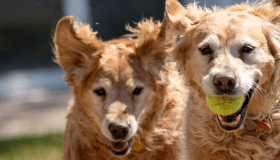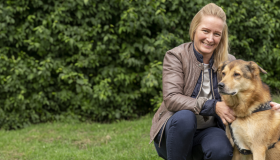
June 21, 2016 – While cancer can affect any dog, certain breeds have a known higher risk for certain types of cancer. For owners of these dogs, awareness of their dog’s susceptibility to these cancers can help them better monitor their pet’s health, as well as discuss with their veterinarian preventive measures to reduce, when possible, the likelihood of their dog developing these cancers. Awareness of symptoms also can lead to earlier detection, often with better outcomes for dogs that do develop cancer.
- Bernese mountain dogs – A recent study looked at Bernese mountain dogs with a history of joint problems and found a relationship between joint disease and later cancer development in the same joint.
- Golden retrievers – Researchers have found two genes that are related to cancer development in golden retrievers. This finding could lead to diagnostic tests to find at-risk dogs before they develop cancer.
- Boxers – A recent survey of brain cancer in 435 dogs found that brain cancer was more common in dogs than previously reported, and boxers were one of the most commonly affected dogs.
- Scottish terriers – A study looking at the effect of adding vegetables to the diet of Scottish terriers, who are at higher risk of bladder cancer, showed a 70 percent reduction in the risk of developing a common type of bladder cancer when vegetables were added to the diet.
- Bouvier des Flandres – Bouviers are predisposed to gastric carcinoma, a type of malignant stomach cancer. A cooperative study from Denmark and Norway looked for breed predisposition to gastric carcinoma, and they found that Bouviers fell into the high- risk group for developing this type of stomach cancer.
- Bullmastiff –Bullmastiffs are reported to have a significantly increased incidence of lymphoma, one of the most common cancers affecting dogs. Lymphoma can spread to a dog’s eye, causing inflammation, glaucoma and bleeding.
- Rottweiler – Rottweilers are predisposed to developing bone cancer because of their large bone structure. Bone cancer is almost always fatal, and unfortunately, therapy against this cancer has not advanced significantly in the last 20 years. However, there is new evidence that bone cancer stimulates a vigorous anti-tumor immune response, and researchers are hopeful that by manipulating this response they can find new and better ways to treat this deadly cancer more effectively.
- Rhodesian ridgeback – Rhodesian ridgebacks have a high incidence of several types of malignant tumors, including soft tissue sarcomas. As the name implies, these cancers arise from connective tissues like muscle and fat. Because they tend to form in the skin or in the area just below the skin, they can look like benign fatty tumors. It is important to get all lumps and bumps checked out by a veterinarian.
- Airedale terrier – Nasal cancer is the most common cause of chronic nasal discharge and bleeding from the nose, and Airedales may be predisposed to nasal tumors. It is important to get any nasal discharge that lasts longer than a week checked by a veterinarian.
- Irish setter – Irish setters are predisposed to the development of insulin-producing tumors called insulinomas. These tumors arise in the pancreas, and produce excessive amounts of insulin. Too much insulin results in low blood sugar, leading to collapse and sometimes seizures.




